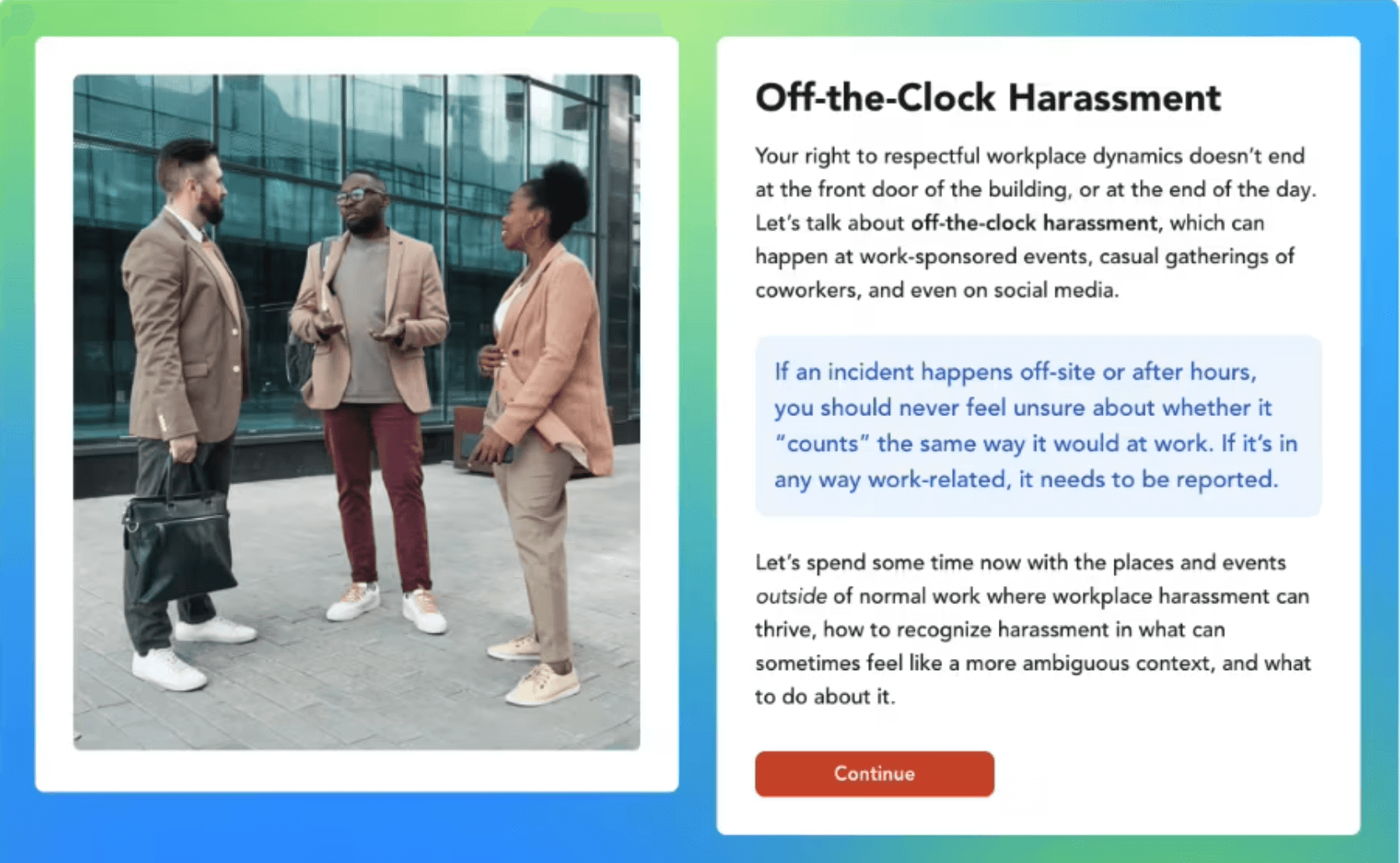Compliance training is a fundamental component of your company's risk management strategy. It ensures that all employees are aware of — and understand — the laws, regulations, and internal policies that govern their work. It's critical not only for legal and regulatory compliance, but also for creating a safe, ethical, and transparent workplace.
What is sexual harassment training?
One popular type of training that falls under the workplace compliance umbrella is sexual harassment training: an educational program aimed at preventing and addressing sexual harassment in the workplace. The training typically covers various topics and includes several key components:
- Definition and examples: Clear definitions of what constitutes sexual harassment, including both quid pro quo harassment and hostile work environment harassment.
- Laws and policies: Information about relevant federal, state, and local laws that prohibit sexual harassment, such as Title VII of the Civil Rights Act of 1964 in the United States. The training should also covers company policies regarding sexual harassment.
- Rights and responsibilities: Education on the rights of employees and the responsibilities of both employees and employers in preventing and addressing sexual harassment.
- Reporting procedures: Detailed instructions on how to report instances of sexual harassment, both within the organization and to external bodies if necessary.
- Bystander intervention: Training on how employees can intervene when they witness harassment, including techniques for safely and effectively stopping harassment and supporting victims.
- Consequences: An explanation of the potential consequences of engaging in sexual harassment, including disciplinary actions and legal repercussions.
- Creating a respectful workplace: Guidance on fostering a culture of respect and inclusion, which often includes training on effective communication, empathy, and understanding boundaries.
Sexual harassment training can be delivered in various formats, including in-person workshops, online courses, webinars, and interactive sessions.
Why is sexual harassment training important?
Aside from being legally mandated in several states, sexual harassment training is critical is because it raises awareness among employees about the subtleties and nuances of harassment.
Many individuals may not realize that certain behaviors, jokes, or comments can be offensive or constitute harassment. Anti-harassment training provides concrete examples and scenarios that illustrate these points, helping employees to understand the impact of their actions on others. This heightened awareness can create a more considerate and empathetic workplace culture, where everyone is more mindful of their interactions.
How to evaluate sexual harassment training platforms
1. Identify your company's unique training needs.
Before you start evaluating training vendors for sexual harassment, it's important to understand your organization's specific compliance training needs. Think about the following:
- Regulatory requirements: What anti-harassment laws and regulations does your organization need to comply with?
- Industry standards: Are there industry-specific standards that need to be addressed? In Illinois, restaurants and bars must provide employees with supplemental training that meets or exceeds the minimum training standards in Section 2-110 of the IHRA.
- Employee roles: Do different roles within your organization require different training modules? In California, managers need to receive specific training on how to report harassment in the workplace.
- Frequency of training: How often will employees need to undergo training or refreshers?
2. Assess each vendor's expertise and experience.
Not all compliance training vendors are created equal. Keep an eye out for providers with a proven track record in your industry — whether that's retail, hospitality, education, healthcare, or tech. Here are three key factors to consider:
- Experience: How long has the vendor been in the compliance training business?
- Customer base: Do they have experience working with companies similar to yours?
- Reputation: Check reviews, testimonials (G2 is a great site for this!), and case studies to gauge the vendor’s reputation and reliability.
Ethena's customer base includes Pinterest, Zoom, Notion, Figma, and so many others. Our Harassment Prevention course has over 2.3 million ratings with a 93% positivity score.
“I loved Ethena's use of humor in training right from the start. It's a breath of fresh air, especially in the tech world where compliance topics can feel heavy. Ethena's training doesn't stop at compliance; it helps us build an ethical, inclusive, and safe company culture. It removes anxiety and fear, making serious topics less intimidating.”
Jen Hecht, VP of People Ops @ Posit
3. Evaluate content quality and relevance.
If you're serious about learner engagement and retention, the quality and relevance of the training you deliver should be top-tier. Ensure the vendor offers:
- Up-to-date material: Compliance standards and regulations change frequently. Verify that the content is current.
- Engaging formats: Look for interactive and engaging content that can enhance learning and retention.
- Customization: Can the vendor tailor the training material to meet your specific needs?

Ethena’s training content is not only crafted by award-winning creatives and experienced educators, but is continuously fine-tuned to keep learners engaged. Plus, our customization options allow you to tailor any of our 150+ training courses to reflect your workplace, brand colors, and values. And did we mention it's available in over 100 languages?
4. Consider technology and accessibility.
In a digital world, the delivery method of the training is as important as the content itself. Evaluate the following:
- Platform usability: Is the training platform user-friendly and easy to navigate?
- Accessibility: Can employees access the training on various devices (desktop, mobile, tablet)?
- Integration: Can the training platform integrate with your existing HR or Learning Management System (LMS)?
5. Review compliance and reporting features.
Effective harassment training is not just about delivering content but also about tracking and reporting progress. Ensure the vendor provides:
- Tracking: The ability to monitor employee progress and completion rates.
- Reporting: Comprehensive reporting tools to generate compliance reports for audits and internal reviews.
- Certifications: Issuance of certificates upon completion, which can be useful (and sometimes required) for compliance records.
6. Examine support and customer service.
Reliable customer support can make a huge difference in your overall experience with a training platform. Consider:
- Availability: Is customer support available 24/7, or during business hours only?
- Support channels: Are there multiple support channels available (phone, email, live chat)?
- Response time: How quickly does the vendor respond to support inquiries?
7. Analyze cost and value.
While cost is an important factor, it should not be the sole determinant. Assess the overall value by considering:
- Pricing structure: Is the pricing per user, per course, or a flat rate for unlimited access?
- Additional fees: Are there any hidden costs such as setup fees, customization charges, or maintenance fees?
- Return on Investment (ROI): Will the training help reduce compliance risks and potential fines?
8. Request a demo, sample training, or free trial.
Before making a final decision, request a demo, grab a sample training, or sign up for a free trial (if available). This allows you to:
- Experience the platform: Get a hands-on feel of the user experience.
- Evaluate the content: Review the quality and relevance of the training material.
- Assess support capabilities: Interact with the vendor’s support team to gauge their responsiveness and helpfulness.
9. Get feedback from stakeholders.
Involve key stakeholders in the decision-making process. This includes HR, legal, compliance officers, and end-users (employees). Gather their feedback on the vendor’s offerings and consider their input in the final decision.
Now that we've covered the steps involved in selecting the right compliance vendor, let's explore some of the most popular and best-loved training programs on the market today.
9 Popular Harassment Training Solutions Available Today
With so many providers offering entire libraries of training programs, it can be tough knowing how to select the right one for your organization. If you follow the structured approach outlined above, you can make an informed decision that aligns with your company's specific needs and goals.
Here are some of the most popular and well-loved anti-harassment training solutions available today.
1. Ethena
Ethena (that's us!) offers modern, bite-sized sexual harassment training that's designed to be engaging, flexible, automated, and data-driven. Our library of 150+ courses is updated regularly to reflect the latest legal requirements and best practices related to sexual harassment, workplace safety and violence prevention, and more.
Features:
- Microlearning format with frequent, short training sessions.
- Real-time reporting and analytics.
- Customizable course content to fit company-specific policies and branding.
Benefits:
- High engagement through short, interactive modules.
- Continuous learning model helps reinforce key concepts.
- Easy to track and measure training effectiveness.
2. EasyLlama
EasyLlama is another popular compliance training vendor that provides mobile-friendly, interactive training tailored to state and federal compliance requirements. Their courses are crafted to be engaging and accessible on any device.
Features:
- Interactive and gamified content.
- Available in multiple languages.
- Customizable training modules.
Benefits:
- High accessibility across devices.
- Engaging content that improves retention.
- Ensures compliance with various regulations.
Drawbacks:
- Overly-engaging content can overwhelm users and extend completion time.
- Extremely manual admin experience that requires every course to be assigned manually, with no enrollment automation capability.
- Fairly mediocre "boilerplate" training content disguised as interactive video.
3. Navex
Navex offers a wide range of compliance training solutions designed to help organizations meet regulatory requirements and foster a culture of ethical behavior.
Features:
- Robust library of compliance courses.
- Customizable content to match organizational policies.
- Integrated risk and compliance management tools.
Benefits:
- Comprehensive coverage of compliance topics.
- Quality integration with other compliance management tools.
- Detailed tracking and reporting capabilities.
Drawbacks:
- Poor customer service and long implementation timelines.
- Frequent upcharges.
- Cumbersome admin experience that makes it difficult to configure learner notifications and deactivate admin accounts.
4. Emtrain
Emtrain focuses on workplace culture and compliance training, using a data-driven approach to prevent sexual harassment and promote respect.
Features:
- Culture diagnostics tools.
- Interactive, scenario-based courses.
- Real-time feedback.
Benefits:
- Uses analytics to tailor and measure training impact.
- Engaging content that drives behavior change.
- Holistic approach to harassment within workplace culture.
Drawbacks:
- Clunky admin experience, with manual admin work and CSV uploads.
- Poor customer support.
- Lacks integration support for HRIS.
- No manager insights into their team's training completion.
5. EverFi
Everfi provides digital education programs focused on critical life skills, including sexual harassment prevention training aimed at creating a respectful workplace.
Features:
- Interactive, video-based content.
- Developed by subject matter experts.
- Impact metrics to measure training effectiveness.
Benefits:
- Engaging and dynamic learning experiences.
- In-depth coverage of harassment and discrimination.
- Detailed analytics and reporting.
Drawbacks:
- Subpar training content. Training is outdated and struggles to capture learners' attention.
- Lack of integrations leaves a lot to be desired. Frequent bugs.
- Frustrating admin experience, with a lag in reporting data and poor reminder automation.
6. Grovo/Cornerstone
Features:
Benefits:
- Affordable.
- Modern content with comprehensive topic coverage.
- Ensures legal and regulatory compliance.
Drawbacks:
Poor customer service experience with impersonal interactions.
LMS doesn't play nice with other integrations.
7. KnowBe4
Benefits:
Drawbacks:
The final word
Selecting the right workplace harassment training provider is essential for fostering a respectful and inclusive workplace. Each of the ten providers listed above offers unique features and benefits, catering to different organizational needs and preferences.
By evaluating these options, you can choose a training program that not only meets legal requirements but also promotes a positive and respectful work environment. Investing in effective harassment prevention training is a key step towards building a culture of respect and safety in your organization.








